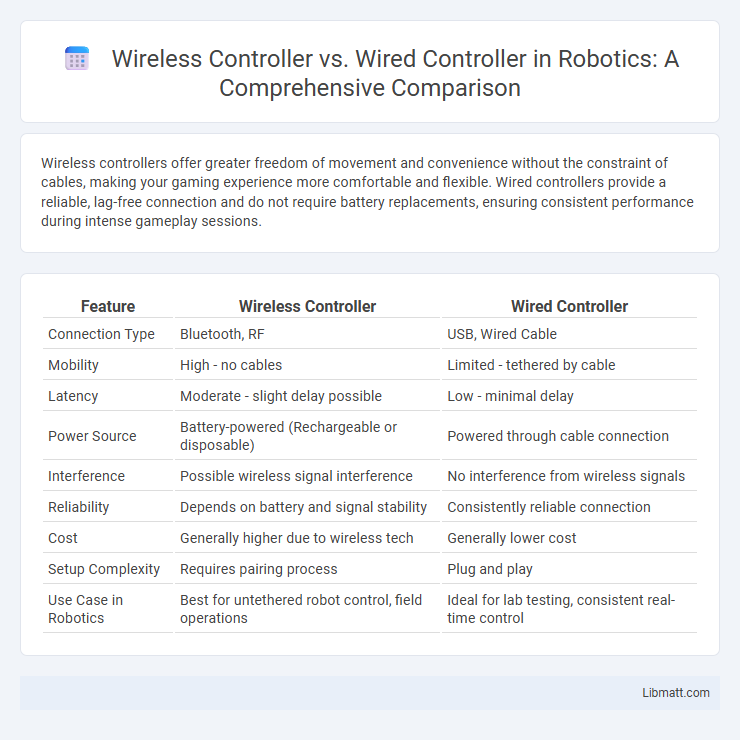Wireless controllers offer greater freedom of movement and convenience without the constraint of cables, making your gaming experience more comfortable and flexible. Wired controllers provide a reliable, lag-free connection and do not require battery replacements, ensuring consistent performance during intense gameplay sessions.
Table of Comparison
| Feature | Wireless Controller | Wired Controller |
|---|---|---|
| Connection Type | Bluetooth, RF | USB, Wired Cable |
| Mobility | High - no cables | Limited - tethered by cable |
| Latency | Moderate - slight delay possible | Low - minimal delay |
| Power Source | Battery-powered (Rechargeable or disposable) | Powered through cable connection |
| Interference | Possible wireless signal interference | No interference from wireless signals |
| Reliability | Depends on battery and signal stability | Consistently reliable connection |
| Cost | Generally higher due to wireless tech | Generally lower cost |
| Setup Complexity | Requires pairing process | Plug and play |
| Use Case in Robotics | Best for untethered robot control, field operations | Ideal for lab testing, consistent real-time control |
Introduction to Wireless and Wired Controllers
Wireless controllers offer freedom of movement and reduce cable clutter, using Bluetooth or proprietary RF technology for connectivity. Wired controllers provide a stable, low-latency connection directly through USB or other cables, ideal for competitive gaming or uninterrupted play. Choosing between wireless and wired controllers depends on your preference for mobility versus consistent input performance.
Performance Comparison: Wireless vs Wired
Wired controllers offer superior latency with minimal input lag, making them ideal for competitive gaming where every millisecond counts. Wireless controllers provide convenience and freedom of movement but may experience slight delays due to signal transmission and potential interference. Your choice depends on whether you prioritize absolute responsiveness or enhanced mobility during gameplay.
Latency and Responsiveness
Wired controllers typically offer lower latency and higher responsiveness compared to wireless controllers, making them ideal for competitive gaming where every millisecond counts. Wireless controllers may introduce slight input lag due to signal transmission, which can affect precision in fast-paced games. Your choice depends on whether you prioritize unrestricted movement (wireless) or optimal performance with minimal delay (wired).
Connectivity and Range
Wireless controllers use Bluetooth or proprietary radio frequency technology to offer flexible connectivity with a typical range of 30 feet, allowing users to play without being tethered to the console. Wired controllers connect through USB or other cables, providing a stable, latency-free connection with no signal interference but limiting user movement to the length of the cable. The choice between wireless and wired controllers largely depends on the priority of mobility versus consistent, lag-free input during gaming sessions.
Battery Life vs Continuous Power
Wireless controllers offer the convenience of mobility but require regular battery recharging or replacement, which can interrupt gameplay during extended sessions. Wired controllers provide continuous power through their connection, eliminating downtime and ensuring consistent performance without the need for batteries. Choosing between the two depends on whether you prioritize uninterrupted playtime or the freedom to move without cables.
Comfort and Ergonomics
Wireless controllers offer enhanced comfort and ergonomics by eliminating cable restrictions, allowing you to maintain natural hand positions and greater freedom of movement during extended gaming sessions. Wired controllers, while often more rigid due to their cords, can be lighter and more compact, which some users find beneficial for precise control and reduced hand fatigue. Your choice depends on whether you prioritize unrestricted motion or a potentially lighter, more balanced grip for optimal ergonomic comfort.
Compatibility with Devices
Wireless controllers offer broad compatibility with modern devices such as smartphones, tablets, PCs, and gaming consoles through Bluetooth and proprietary wireless protocols. Wired controllers ensure consistent compatibility with devices featuring USB or proprietary ports, often preferred for platforms requiring low latency. Device compatibility depends on the controller's connectivity options and supported operating systems, making it essential to verify compatibility before use.
Price Differences and Value
Wired controllers typically offer a lower price point due to simpler technology and manufacturing processes, making them a budget-friendly option for gamers. Wireless controllers generally cost more but provide enhanced convenience and freedom of movement, adding value for those seeking a cable-free gaming experience. Your choice depends on balancing cost efficiency with the importance of mobility and comfort during gameplay.
Durability and Maintenance
Wired controllers typically offer greater durability due to fewer moving parts involved in wireless transmission, reducing potential points of failure. Maintenance for wireless controllers often requires battery management and occasional firmware updates, whereas wired controllers only need cable inspections and replacement when damaged. The physical wear on wired controllers is mostly limited to the connection port and cable, making them simpler and more cost-effective to maintain over time.
Choosing the Right Controller for Your Needs
Wireless controllers offer the advantage of increased mobility and freedom, making them ideal for gamers who prefer playing from a distance without cable restrictions, while wired controllers provide a more stable and responsive connection with virtually no input lag, beneficial for competitive gaming. Choosing the right controller depends on your priority between convenience and performance, as wireless options may require charging and occasional pairing, whereas wired controllers deliver consistent power and instant responsiveness. Assessing your gaming setup, including distance from the console or PC and tolerance for latency, will help determine the most suitable controller type.
Wireless controller vs Wired controller Infographic

 libmatt.com
libmatt.com